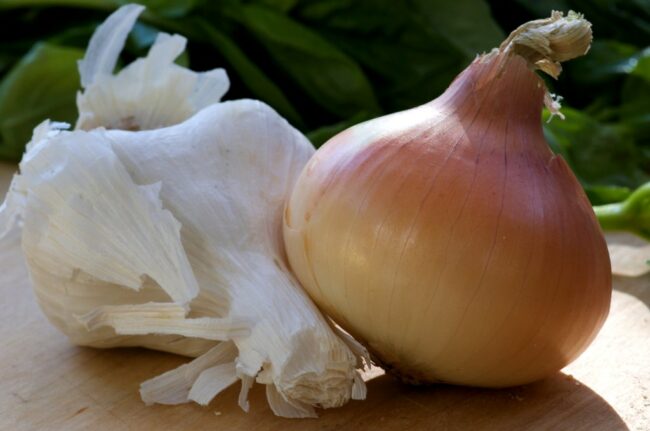Breast cancer is the most common cancer affecting women worldwide, causing 15% of all cancer deaths among women in 20181. Mammograms (X-ray pictures of the breast) have been useful in early detection, but is it possible for women to lower the risk of developing breast cancer? Let’s take a look at the research!
Recently published research has found that eating garlic and onions may be linked to a lowered risk of breast cancer2. One study focused on the consumption of sofrito, a popular condiment made from garlic and onions. Conducted between 2008 and 2014, the study included 314 women with breast cancer and 346 control subjects.
The researchers found that those who have never consumed sofrito were slightly more likely to develop breast cancer compared to those who regularly consumed the condiment. However, the researchers acknowledged that they did not use a standardized recipe for sofrito for this study. Since sofrito is frequently homemade, the recipe might vary. The study did not account for this and therefore cannot be certain that the results were due to the sole effect of onions and garlic. While a difference was recorded, a larger, more robust study must be conducted with greater control over the garlic and onion intake, and the confounding factors.
This is supported by previous studies which revealed that garlic and onion consumption could factor into reducing the risk of developing colon3, prostate4, ovarian, oesophageal, laryngeal, oral, as well as renal cancer5. Yet, it is difficult to prove whether or not eating garlic and onion can help overcome the risk of cancer progression for a variety of reasons.
Aside from things like genetics and lifestyle, how we prepare the vegetables, previous history of cancer or precancerous conditions, and the differences in our gut microbiome (all microorganisms, bacteria, fungi etc. present in our gastrointestinal tract) can also affect the development of cancer and the influence of garlic and onion6.
Why are some scientists interested in the possible link between garlic and onions with cancer?
Onions and garlic are rich in flavonols and organosulfur compounds, which are generated upon cutting or chewing. Diallyl disulphide and S-allylmercaptocysteine – compounds found in garlic and onions, respectively – inhibit cell proliferation in vitro (studies conducted in labware), preventing the increase of cell numbers7. Overproliferation of cells is an important part of cancer development and progression. S-allylmercaptocysteine also appears to selectively inhibit cell proliferation, inhibiting the proliferation of cancer cells but not normal cells8.
Quercetin, found in onions, has been shown to reduce the expression of mutant p53 protein in breast cancer cell lines9. Mutant p53 proteins drive the formation of precancerous lesions, which may develop into malignant cancer10. In cancer itself, mutant p53 protein promotes cancer cell proliferation, survival, and metastasis, and increases the cancer’s chemotherapy resistance11. Quercetin and allicin, components of garlic, can also inhibit the proliferation of certain breast cancer cell lines12 13. However, certain spider venoms can also stop cell proliferation, but we definitely don’t suggest cancer patients find venomous spiders to bite them14! Therefore, as exciting as it sounds, scientists will need further studies and controlled testing in animal models to show clinical significance.
Both onions and garlic have radical scavenging activities. Radical scavenging refers to a substance, such as an antioxidant, that helps protect cells from the damage caused by free radicals. Damage from these free radicals can build up in the cells and may increase the risk of developing cancer15 16. In studies with rats, extract of garlic powder was found to stimulate the proliferation of rat spleen white blood cells. This indicate immune modulation, a way to harness a patient’s immune system to attack their tumour cells. This gives the body an additional line of attack against the cancer17.
While the evidence looks promising, the research should be taken with a pinch of salt. More replication studies are certainly needed, and the next studies should have a bigger population, with a determined amount and frequency of food garlic and onion intake. The future participants’ dietary intake must also be monitored to investigate whether garlic and onion consumption alone can lower the risk of having breast cancer.
Simply eating garlic and onion will not decrease cancer risk as there is a complex interaction which is not yet fully understood. Moreover, many other factors such as our lifestyle, diet, genetic, and environmental factors contribute a lot to the risk of developing cancer. Meanwhile, it won’t hurt to start adding garlic and onions to our food.
Edited by Frankie Macpherson
References
- www.who.int/cancer/prevention/diagnosis-screening/breast-cancer/en/
- www.tandfonline.com/doi/full/10.1080/01635581.2019.1651349
- www.ncbi.nlm.nih.gov/pubmed/30790463
- www.ncbi.nlm.nih.gov/pubmed/12419792?dopt=Abstract
- www.ncbi.nlm.nih.gov/pubmed/17093154?dopt=Abstract
- www.ncbi.nlm.nih.gov/pmc/articles/PMC4366009/
- www.tandfonline.com/doi/full/10.1080/01635581.2019.1651349
- www.sciencedirect.com/science/article/pii/S2211383517302538
- www.tandfonline.com/doi/full/10.1080/01635581.2019.1651349
- www.ncbi.nlm.nih.gov/pmc/articles/PMC3135636
- www.nature.com/articles/s41418-018-0246-9
- www.sciencedirect.com/science/article/pii/S2211383517302538
- www.ncbi.nlm.nih.gov/pmc/articles/PMC4619597/pdf/pone.0141370.pdf
- www.nature.com/articles/aps200557
- www.nature.com/articles/s41418-018-0246-9
- www.cancer.gov/publications/dictionaries/cancer-terms/def/free-radical-scavenger
- www.nature.com/articles/bjc2014348.pdf

